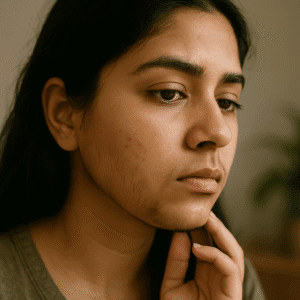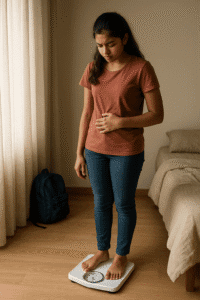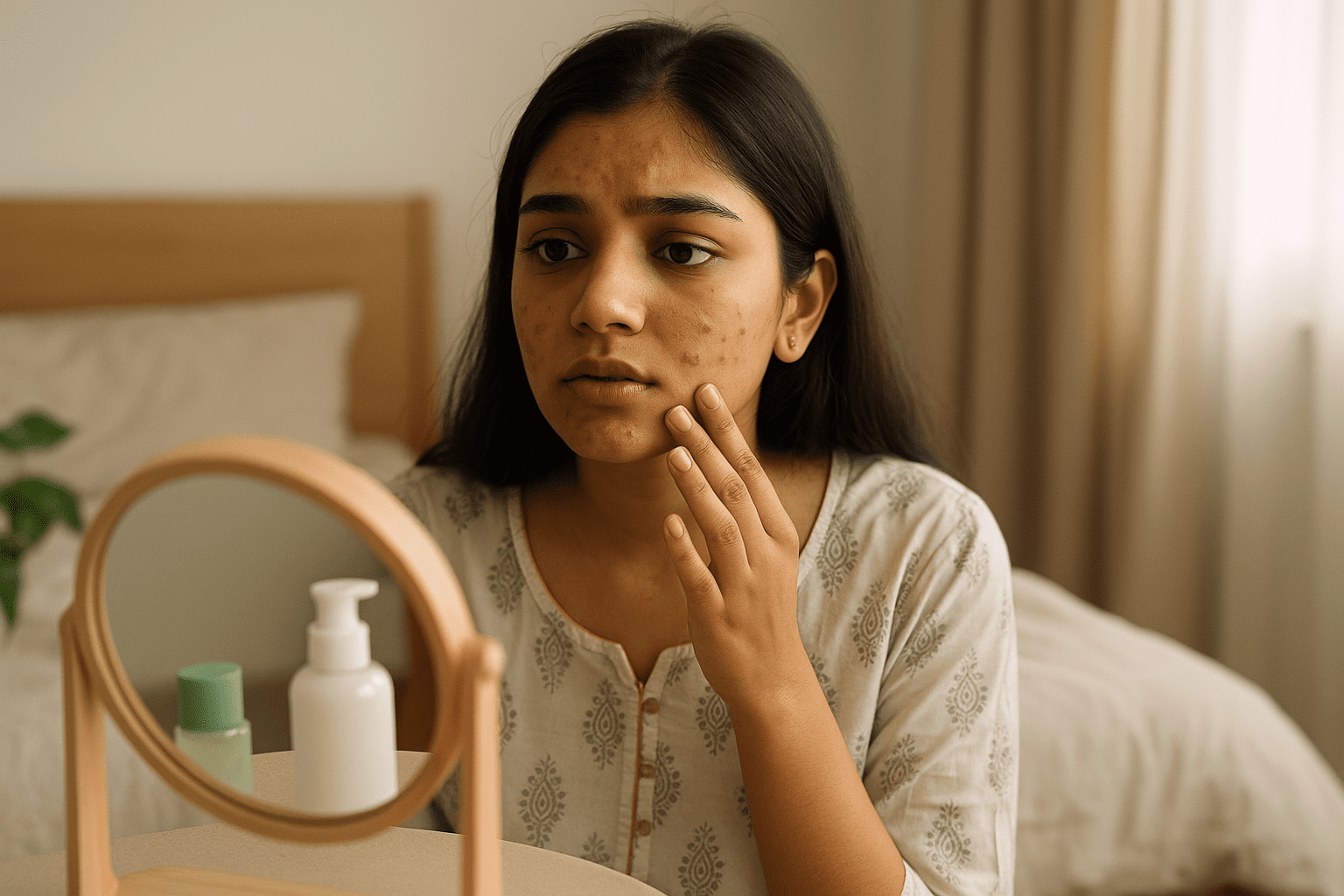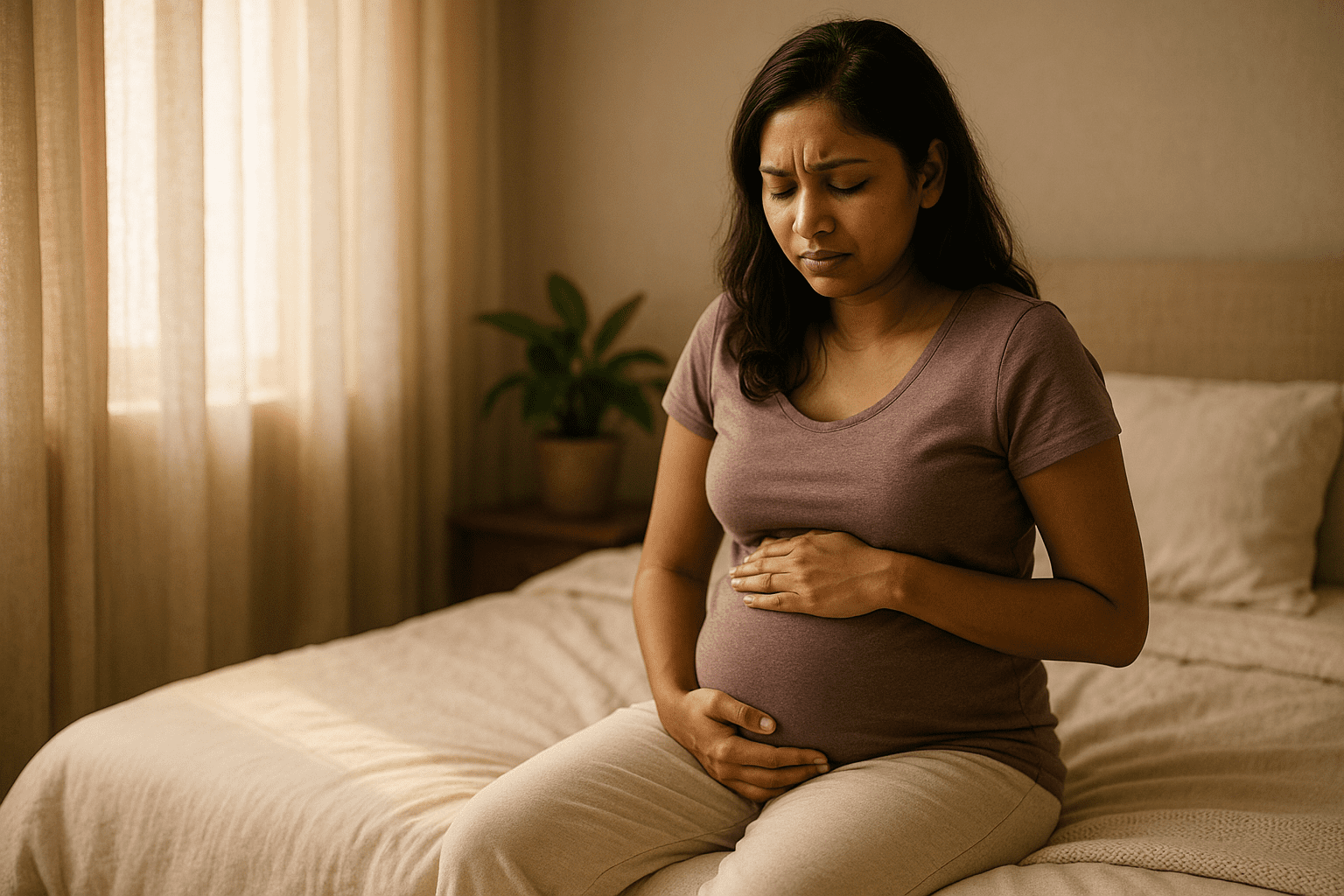In my previous article, I explained what PCOS really is. This one is a follow-up, focused on helping you understand the common PCOS causes. If you’ve ever wondered why this condition happens, you’re not alone. I’m writing this to share both medical insight and real-life patterns I’ve seen over the years.
Across India, PCOS is becoming alarmingly common. Depending on the region and criteria used, studies show prevalence rates ranging from 3.7 percent to over 22 percent. In metro cities like Delhi, the numbers are even higher. A 2024 review showed nearly one in five urban women could be affected. That’s not just a statistic. You can read more about the PCOS crisis here.
In clinic, I often meet teenage girls who come in with their parents, unsure and overwhelmed. Sometimes the focus shifts from support to blame. “You must be eating too much.” “You’re not active enough.” I see it happen. I also see the hurt in their eyes.
That’s why we need to talk about PCOS causes with compassion. Understanding the why, not just the what, is where healing begins. You’re not to blame. You’re not broken. You are definitely not alone.
Probable Causes of PCOS
Not all women with PCOS have the same set of triggers. These are the most common ones I see in clinic:
1. Genetics: The inherited link we often ignore
One of the most overlooked PCOS causes is genetics. If your mother, sister, or aunt struggled with irregular periods or facial hair, chances are there’s a hereditary link. In clinic, I always ask women if there’s a family history of delayed cycles, weight gain, or excess facial hair. The number of times I hear, “Yes, my mom had something similar,” is too many to count.

Genetics doesn’t mean you are doomed, but it does mean your body might be more sensitive to hormonal imbalances. This genetic tendency often shows up as early as adolescence. I’ve seen girls as young as 13 walk in with classic PCOS signs and strong family histories. That is why understanding genetic PCOS causes can be key to early intervention.
Even if your blood tests seem okay now, knowing your family history gives you a head start. You can be proactive about tracking your cycles, supporting insulin sensitivity, and noticing changes early. The more we acknowledge genetic PCOS causes, the more we empower women to take charge of their health without blame or shame.
So if your mom, maasi, or elder sister had symptoms that were brushed off, bring that history to your gynaecologist. It could be the first clue in your own PCOS story.
2. Insulin Resistance: The metabolic disruptor
Among the most common PCOS causes, insulin resistance quietly disrupts the body’s hormonal rhythm. It means your body is making insulin but not using it effectively. So it compensates by producing even more. That extra insulin then nudges your ovaries to produce more androgens — male hormones that worsen PCOS symptoms.
You might see this show up as weight gain around the belly, sugar cravings, or skin darkening near the neck or underarms. But even thin women can have insulin resistance. It’s not about size, it’s about how your cells respond to sugar and insulin.
This is why we often recommend fasting insulin tests, not just blood sugar levels. They show what’s happening behind the scenes. Identifying insulin resistance as one of the PCOS causes allows for a better management plan. More protein, more fibre, less refined sugar, and movement after meals can all help.
Once your insulin stabilises, your hormones start responding better. I’ve seen women regulate their cycles just by walking after dinner and eating real food. It’s not a fad — it’s foundational.
So if you’re facing persistent PCOS symptoms, look closely at this often-missed factor. Insulin resistance may not be loud, but it’s one of the root PCOS causes that can quietly change everything.
3. High androgen levels: more than just “male hormones”
Excess androgens are central to many PCOS causes. These are male hormones like testosterone that all women naturally produce in small amounts. But in PCOS, the balance tips. Androgens increase, which disrupts ovulation and leads to acne, unwanted facial hair, and scalp hair thinning.
This hormonal tilt affects both how you feel and how you look. Many women don’t realise that the hair growth on their chin or chest isn’t just cosmetic. It’s hormonal. And unless we understand these androgen-driven PCOS causes, treatment remains superficial.

High androgens also prevent the follicles in your ovaries from releasing eggs. That’s why periods become delayed or unpredictable. You might see multiple tiny follicles on an ultrasound, but none mature enough to ovulate.
Treating androgen excess involves calming the body’s hormonal environment. That may include diet shifts, stress reduction, or medications like anti-androgens or birth control, depending on your stage and goals.
So if you’re noticing skin or hair changes that feel “off,” don’t just reach for a cream or serum. It could be a sign of deeper PCOS causes rooted in androgen imbalance.
4. Chronic Inflammation: The body’s silent alarm
Another key player in PCOS causes is chronic low-grade inflammation. Unlike the swelling you see after an injury, this inflammation is internal and ongoing. It keeps your immune system on edge, pushing your ovaries to make more androgens. That, in turn, worsens the hormonal imbalance.
This hidden inflammation can come from processed foods, poor gut health, unmanaged stress, or even pollution. You may not feel it as pain, but it shows up as fatigue, skin breakouts, or unexplained weight gain. Some women also have high CRP levels – a marker of inflammation – even when their regular blood work looks normal.
Identifying this as one of the PCOS causes helps reframe your approach. It’s not just about cutting carbs or losing weight. It’s about calming the body’s internal fire. That means more anti-inflammatory foods like turmeric, leafy greens, berries, and omega-3 fats.
I once treated a woman whose only symptom was extreme bloating. Turned out, her inflammation was flaring her PCOS. By addressing it, we saw visible improvements within weeks.
Chronic inflammation doesn’t always scream. But among PCOS causes, it is one of the quiet disruptors we must not ignore.
5. Hormonal Imbalance: The miscommunication within
One of the broader PCOS causes is hormonal imbalance. This doesn’t just mean too much or too little estrogen. It’s about the entire hormonal orchestra going out of tune.
In PCOS, levels of LH (luteinising hormone) often rise relative to FSH (follicle-stimulating hormone). That mismatch disrupts ovulation. On top of that, many women have low progesterone, which can lead to mood swings, sleep issues, or irregular bleeding.
Meanwhile, cortisol (the stress hormone) and insulin are often elevated, which further worsens the hormonal storm. Androgens spike. Estrogen may remain high but unopposed. The cycle becomes unpredictable, and symptoms vary widely.
Understanding this layered picture is crucial when addressing PCOS causes. There’s no one-size-fits-all fix because the hormone pattern is unique for each woman.
We sometimes use hormone panels to map out the imbalance. But even without labs, listening to your symptoms – sleep, skin, hair, energy, periods – gives us clues.
Hormonal imbalance is one of the most foundational PCOS causes, and supporting the endocrine system takes time. But with the right plan, it’s absolutely possible.
6. Weight and Fat Distribution: More than just numbers
Weight itself is not one of the PCOS causes. But how and where your body stores fat plays a critical role. Women with PCOS often store fat around the abdomen, known as visceral fat. This is not about body shaming – this fat is biologically active and worsens insulin resistance.
Even women with a healthy BMI can have this pattern. I’ve seen patients who look lean but have central weight gain that triggers hormonal imbalance. That’s why we talk about waist circumference, not just weight.

Visceral fat releases inflammatory chemicals and increases insulin resistance, both of which worsen PCOS symptoms. This fat also stimulates more androgens, feeding into the same cycle again.
Identifying this aspect of PCOS causes allows for a more focused treatment plan. Strength training, protein-rich meals, and enough healthy fats help mobilise stubborn belly fat without triggering stress on the body.
If your body shape has changed despite no major lifestyle shifts, it’s not just in your head. It could be how your hormones are responding. And recognising fat distribution as one of the PCOS causes helps shift the blame from willpower to biology.
7. Stress and Sleep: The everyday disruptors
Among the most underestimated PCOS causes is chronic stress and poor sleep. These aren’t just lifestyle factors – they shape your hormonal rhythm every single day.
High stress elevates cortisol, which spikes insulin and interferes with ovulation. Sleep deprivation does the same. Over time, this disrupts appetite, mood, and even immune balance. It’s all connected.
In clinic, I always ask: How are you sleeping? Are you tired even after rest? Do you scroll late into the night or wake up at 3 am with your mind racing? These are clues your nervous system is on high alert.
Recognising stress and sleep as PCOS causes means we treat them with as much seriousness as blood sugar or diet. Building better sleep routines, adding restorative movement like yoga or walks, and protecting time to wind down can bring real hormonal relief.
I’ve seen women make no diet changes, yet their cycles return after sleeping better. That’s how powerful these so-called soft factors are.
Your hormones crave rhythm and recovery. Ignoring stress and sleep in the list of PCOS causes is like fixing a leak but leaving the tap running.
Common PCOS Symptoms and Their Root Causes
| Symptom | Related PCOS Causes |
|---|---|
| Irregular periods | Hormonal Imbalance, Androgen Excess, Insulin Resistance |
| Acne and oily skin | Androgen Excess, Chronic Inflammation |
| Unwanted facial or body hair | Androgen Excess, Hormonal Imbalance |
| Thinning scalp hair | Androgen Excess, Stress and Sleep |
| Weight gain (especially belly) | Insulin Resistance, Weight Distribution, Chronic Inflammation |
| Fatigue or low energy | Chronic Inflammation, Stress and Sleep, Hormonal Imbalance |
| Mood swings, poor sleep | Hormonal Imbalance, Stress and Sleep |
| Sugar cravings | Insulin Resistance, Stress and Sleep |
| Skin darkening (neck, underarms) | Insulin Resistance |
| Bloating or digestive discomfort | Chronic Inflammation, Stress and Sleep |
Conclusion
If you’ve read this far, I want to pause for a moment and honour that. PCOS can be overwhelming, not just the symptoms, but the confusion, the myths, the “why me?” that hangs heavy on so many shoulders. And too often, women carry that weight silently, thinking they did something wrong. You didn’t.
The causes of PCOS are many, but they’re not personal flaws. They’re reflections of how your body processes hormones, stress, food, sleep, and genes. And while that might sound complicated, the path forward doesn’t have to be. When we understand our triggers, we can take action that feels nourishing, not punishing.
In my clinic, I’ve seen women break down because they finally had a name for what they were feeling. I’ve seen others light up because they realised they had more options than just birth control or weight loss. And I’ve seen strength in women who decided to partner with their bodies instead of fighting them.
If nothing else, I hope this blog helped you feel a little more seen. A little more informed. And a lot more supported.
Every woman’s body is different, and every one deserves care that honours that uniqueness. I’ve written more about fertility, hormones, periods, and postpartum healing in my Bump & Beyond blog series to help you understand your body, not fear it.
Disclaimer
This article is intended for informational purposes only. It is not a substitute for medical advice, diagnosis, or treatment. Every woman’s health story is unique, and it’s important to consult with your doctor or a qualified health professional for personalised care.
Frequently Asked Questions About PCOS Causes
1. Can lifestyle changes help reverse PCOS causes?
Absolutely. Addressing PCOS causes like insulin resistance and stress can improve symptoms. With consistent habits around sleep, food, and movement, many women see their cycles normalize and energy return. Lifestyle plays a central role in managing most PCOS causes.
2. Are PCOS causes the same in every woman?
Not at all. PCOS causes vary by person. One woman may have insulin resistance, while another struggles more with stress or inflammation. Understanding your unique PCOS causes helps create a treatment plan that’s actually sustainable and supportive.
3. Is it possible to have PCOS without showing symptoms?
Yes. Some women have PCOS causes like hormonal imbalance but no visible signs. Others may have cysts without irregular periods. That’s why diagnosing based only on appearance or scans misses the deeper PCOS causes in many cases.
4. Can teenage girls have the same PCOS causes as adults?
Yes. PCOS causes like androgen excess, poor sleep, and family history can start early. I often see teens with classic signs. Early awareness helps manage PCOS causes before they spiral into long-term health issues.
5. Do PCOS causes always lead to fertility problems?
Not necessarily. Many women with PCOS causes affecting ovulation still conceive naturally. Others may need mild support. The key is identifying the PCOS causes early so hormones can be balanced and the body supported gently.

Meet Dr. Sonia Iyer — a seasoned gynecologist, mom of two, and trusted voice for women navigating the beautiful chaos of pregnancy and early motherhood. With over 11 years of clinical experience and a deep understanding of real-life parenting, she brings clear, compassionate, and expert-backed advice to every blog she writes.




Pingback: 12 Chronic Effects of PCOS That Can Lead to Medical Emergency
Pingback: Pcos Weight Gain: 7 Hormonal Triggers You Can Fix Today